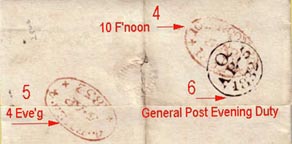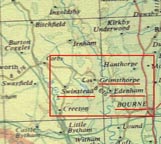[Images and text by the author. Eunice and Ron Shanahan have shared with readers of the Victorian Web this material from their website, Letters from the Past. Click on thumbnails for larger images.]
This letter was written on 4 April 1832 by Mr August. Warren, solicitor, in Great Russell Street London to Lewis Kennedy Esqr at 21 Hans Place also in London concerning property in Swinstead, which is in Lincolnshire. There are seven postal markings of varying quality which tell the story of its journey and how much trouble they went to, to have it delivered. This is the list of postmarks, beginning with those on the front address panel.

1 and 2 — Sloane St, N.O.: twice as two attempts were made at delivery. The postage marks 5 and 6 show when this was done. Sloan St N. O was in the Country area of the Twopenny post in the 1828 listing and so this explains the next mark
3 — Handstruck ‘3’ for payment for delivery from one part of London
to another, and then this has been crossed through, as the letter had to be
transferred to the General post for delivery to Grimsthorpe, Bourn, Lincolnshire.
7 — the charge mark of ‘9’ which was the cost of final delivery
to Mr Kennedy when it caught up with him in Lincolnshire. This was for a distance
of between 80 and 120 miles and Bourn was 94 miles from London, but that seems
to ignore the 3 pence due for the
Twopenny post — so I wonder whether Mr Warren had paid the 3d, for the local
service, but left the addressee to pay the postage from London to Lincolnshire.
The letter was dated on the inside 4th, but note that on the outside, ‘5th’
was written on the front of the address panel, (apparently by the person who
added the redirection to Bourn Grimsthorpe), to explain the delay in delivery.
 Then on
the reverse of the letter
Then on
the reverse of the letter
4 and 5 — two transfer stamps applied at the Westminster office of the TP with the date before the month 10 f’noon 5 SP, and 4 Even the same day, This was because the addressee was away from home so the letter came back to the office for re-delivery. As it was then redirected, and it was outside London, it was then transferred to the General Post and received
6 — the evening duty stamp AP 5 1832 with the identifying letter ‘Q’. In 1830, a change was made by transposing the month and the code letter. This was in use for ten years, and in this time variations occurred. In some stamps there was a hyphen between the month and the day, and the lettering was not always the same, some having thicker lettering than others. This is to be expected because, as they were recut frequently it would not be possible to have completely identical stamps in those circumstances over that period of time. This evening duty stamp is of the type in use from 1830-1840, with serif letters, code letter above the month, and in this case also a hyphen between the month (April) and the date (the fifth).
The contents of the letter
Dear Sir,
I ought to have written to you before this time, as to the proposed purchase of three cottages belonging to the parish of Swinstead; formerly such property could not be sold, but by a late Act of parliament the Churchwardens and Overseers are authorised by the directions of a Vestry and with the consent of two Justices of the peace to sell any Work or other house belonging to the parish — Lord Willoughby can therefore have a complete title under this Act to the houses in question.
Note: The "vestry" is the vestry meeting which governed church and local affairs, so named because members met in the church vestry, the members were elected from the parish inhabitants. I tried to identify which Act of Parliament had been passed around 1832 to allow the sale of Workhouses, or other such buildings, but there were so many Bills passed through Parliament in that year it was impossible to trace it without knowing more details.
The Houses were in 1797 conveyed to Edward March, Peregrine Rosling & William Beezley, if either of these persons are living they should join in the conveyance or the heirs of the survivor should join. I presume that there will be no difficulty in obtaining the concurrence of the parties required and if not I will send the form of consent to be given. I shall want also the names of the present Churchwardens and Overseers of Swinstead.
I remain, Dear Sir,
Your obedient humble servant
Augt. Warren Senr.(?)
Then a note has been added
W. Smith of Horbling is authorised to proceed with the proposed Exchange for Charity lands at Edenham.

Swinstead is in Lincolnshire in Parts of Kesteven, and this map shows how close the places mentioned in this letter are to one another. The squares represent 6 miles, so these places are all within about a 2 to 3 mile radius.
I checked on the internet and Rex Needle had a website called Bourne in Words and Pictures. Rex, who is a local historian, kindly gave me information about the area. He was unable to trace any record of the addressee Lewis Kennedy, but advised that
Swinstead is practically owned by the Grimsthorpe Estate, home of the De Eresby family (Ancaster and Willoughby are among their title names), and they would therefore be anxious to buy up any properties in the area. In this instance, the estate was buying from the Church of England.
The website has photos of the village, and I wondered if any of them may be those mentioned in this letter, however, Rex advised that
The majority of these small cottages have since been sold by the estate over the years and converted into single homes, taking in two, three and sometimes four previous cottages. Also, many of them bear the Ancaster family crest and so it would be impossible to say which is which without a close inspection of the deeds.
Even so, the fact that there are any cottages still existing is an interesting link with the letter. There were also several entries for Peregrine Gosling in the parish records, but it was not possible to identify which one would have been on the original conveyance, but a likely prospect was the Peregrine ROSLING baptised 25 March 1765, which would have made him 32 in 1795, and certainly old enough to be named on the conveyance. However, from this distance in time, it is unlikely I would ever be able to find out for certain.
16 April 2005